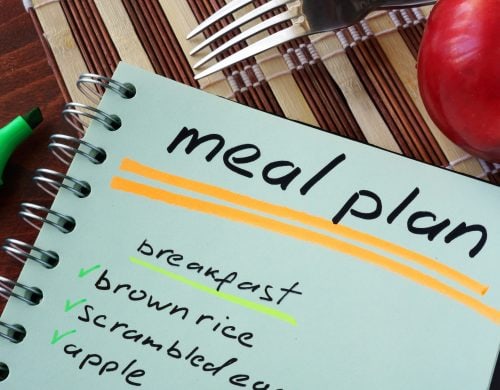
Healthy Food Guide nutritionist Claire Turnbull explains how meal plans can be a lifesaver in busy times.
We can be faced with more than 200 decisions about food daily, meaning what and how we eat can contribute to decision fatigue.
By planning your meals in advance, you can keep the decisions to a minimum, or spread them out over a longer period. You’ll be amazed how clearing your mind can help keep your pantry stocked with better choices.
Getting started
First up, you need to find a meal planning style that works for you. Doing a meal plan for a full week at a time seems to work well for a lot of people. Others can manage two weeks at a time. And, if you actually enjoy going shopping a few times a week, then every three to four days in advance might be progress for you.
Working out what to eat and writing the plan
I recommend putting together a ‘recipe bible’, which is basically recipes you have tried, tested and you know go down well in your house. You can then use these recipes to help you make your plan.
Start by writing down what you will have for dinner for the next few days/week/fortnight and then work out if you can make any of the meals in bulk to freeze for the next week, or if you can cook extra for that meal to have for lunch the next day. If I am doing a roast chicken, for example, I might cook two chickens at once. This way, I have one for dinner and then one for lunches for everyone, and can freeze any we won’t use within three days. Or, if I am making a big salad for dinner, I will make an extra salad in a lunchbox, ready for the next day to have with some chickpeas and tuna.
When you have your plan, you are then ready to write your shopping list, easy as that.
Keeping it interesting
It can help if you have a theme for each night. For example, Monday: meat free, Tuesday: fish, Wednesday: mince, Thursday: eggs, Friday: homemade healthy version of a takeaway. Or maybe go with country themes, such as Italian, Mexican, Thai – it just helps mix things up!
What about when plans change?
If you are a person who has a lot on, or know that things can easily change at the last minute, with kids’ activities or people popping round, then there are a couple of things to try.
1. Plan in one or two five-minute meals and move them around as you need. Some quick and easy ideas include omelettes, fresh filled pasta with frozen veges, or vegetable and lentil soup with wholegrain toast and avocado.
2. Bulk-cook meals so if a crowd appears with little warning, you can pull out a curry, casserole or soup to feed them. When I freeze meals, I put them into large plastic freezer bags and lay them out flat on a baking tray, then pop them in the freezer. This makes meals really easy to stack in the freezer. They will defrost much more quickly too.
After a couple of weeks of meal planning, it will become a habit for you. It should make life that little bit easier and make you more in control of your decision making.
Download the Healthy Food Guide weekly meal planner
Some other helpful meal planning resources are here:
Freezer Meal Planner
Top tip! Pop your meal planner on the fridge so you remember what to take out of the freezer in the morning.
www.healthyfood.com











